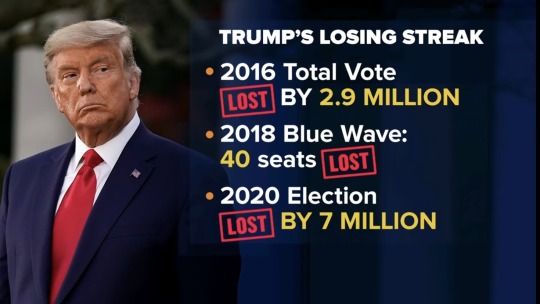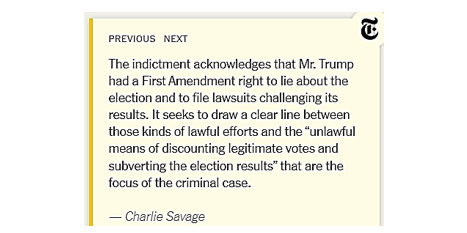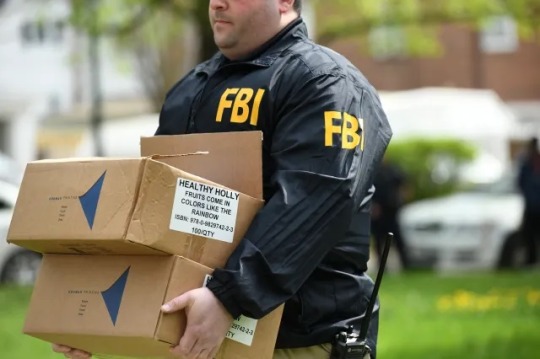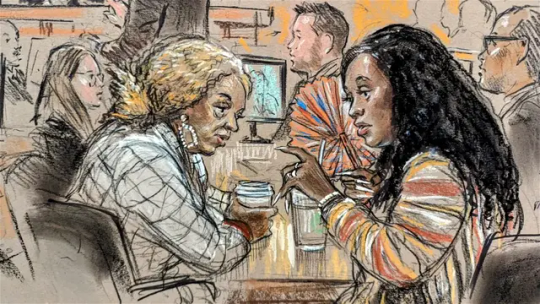#conspiracy to defraud the United States
Text
Barely a day after former President Donald Trump was indicted for the third time, some Senate Republicans are already trying to undermine the credibility of the federal judge who was randomly assigned to preside over his trial.
Here’s a detail they’re hoping you won’t notice: They unanimously voted to confirm her.
Sen. Ted Cruz (R-Texas), speaking on his podcast on Wednesday, accused U.S. District Judge Tanya Chutkan of being “relentlessly hostile” to Trump and claimed that she has “a reputation for being far-left, even by D.C. District Court standards.”
But Cruz voted to put Chutkan into her seat on the U.S. District Court for the District of Columbia in June 2014. So did every other Senate Republican when she was unanimously confirmed, 95-0.
That includes Sen. Lindsey Graham (R-S.C.), who nonsensically claimed Wednesday that “any conviction in D.C. against Donald Trump is not legitimate.”
“The judge in this case hates Trump,” Graham said in a Fox News interview. “You can convict Trump of kidnapping Lindbergh’s baby in D.C. You need to have a change of venue. We need a new judge. And we need to win in 2024 to stop this crazy crap.”
Aides to Cruz and Graham did not respond to requests for comment on how the senators square their votes to confirm Chutkan with their criticisms of her ability to be a fair judge.
Tuesday’s federal indictment of Trump accuses him of serious crimes related to the 2020 presidential election and the Jan. 6, 2021, Capitol insurrection: conspiracy to defraud the United States, conspiracy to obstruct an official proceeding, obstruction of and attempt to obstruct an official proceeding, and conspiracy against rights.
Chutkan, a Jamaica-born former assistant public defender and an appointee of former President Barack Obama, has already been overseeing cases related to the Jan. 6 attack. She’s handed out some of the most aggressive sentences yet to rioters who took part in the violence that day. Of the 11 cases that have come before her, she imposed tougher sentences than those sought by the Justice Department seven times and matched what the Justice Department was seeking four times, according to an Associated Press review.
In all 11 cases, Chutkan sentenced the defendants to prison time.
This is what is likely driving the GOP attacks on Chutkan: They know she’s not likely to go easy on Trump now.
Beyond trying to discredit the judge, some Republicans, like Graham, are parroting Trump’s absurd demand for a change of venue. The former president has called for moving his case to the “more diverse” and “politically unbiased nearby State of West Virginia!” (Virginia and Maryland are much closer to D.C., for what it’s worth.)
Not a single Republican raised concerns about Chutkan during her nomination hearing in the Senate Judiciary Committee in February 2014. In fact, only one GOP member of the committee even showed up to the hearing: Sen. John Cornyn (Texas), who was only there to rave about a separate Texas judicial nominee on the schedule. He left before Chutkan was up.
Cruz and Graham were both members of the committee at the time.
Neither attended Chutkan’s hearing.
#us politics#news#huffington post#republicans#conservatives#donald trump#2023#capitol protests#capitol riot#capitol riot investigation#jan 6 investigation#jan 6 insurrection#sen. ted cruz#Judge Tanya Chutkan#U.S. District Court for the District of Columbia#us senate#sen. lindsey graham#conspiracy to defraud the United States#conspiracy to obstruct an official proceeding#obstruction of congress#attempt to obstruct an official proceeding#conspiracy against rights#the associated press#West Virginia#Senate Judiciary Committee#Sen. John Cornyn
252 notes
·
View notes
Text
Attempted murder of democracy remains a crime
The Trump indictment made for some suprisingly unsettling reading, but we cannot forget that Trump and his fascism-curious minions really did stage orchestrated attempts to null out the ballots of millions of people.
The wheels of justice turn slowly, but they may yet grind whatever is left of Donald Trump’s reputation into radioactive dust. The 45th president’s arraignment Thursday on charges of overturning the 2020 election made him the 1,078th person to face charges tied to the Jan. 6, 2021 insurrection–but unquestionably the most important.
And while United States of America v. Donald J. Trump represents…

View On WordPress
#2020 election#conspiracy to defraud the United States#election conspiracy theories#fake electors#January 6#rule of law#Trump charges#Trump coup attempt#Trump cult#Trump indictment
0 notes
Text








#accountability#January 6 committe final report#obstructing an official proceeding#conspiracy to defraud the United States#conspiring to make false statements#insurrection#January 6#democracyontheballot
0 notes
Link
The House January 6th Committee will go out with a bang.
According to multiple (AP) reports (CNN) published Friday night (NYT), the committee is gearing up to refer Trump for obstructing an official proceeding and conspiracy to defraud the United States. And in something of a surprise development, the committee is adding “insurrection” to the package. Trump’s allies are also on the hook: According to the Times, “the panel is likely to consider referring charges against John Eastman, a conservative lawyer who was an architect of Mr. Trump’s efforts to invalidate his electoral defeat.”
The referrals don’t automatically mean Attorney General Merrick Garland will pursue the committee’s recommendations. Federal prosecutors are already in the thick of their own extensive probe. And according to CNN, the committee is preparing to issue a slew of “five to six other categories of referrals, such as ethics referrals to the House Ethics Committee, bar discipline referrals and campaign finance referrals.”
Trump’s legal problems may be the real reason he’s engaged in odd fundraising such as the recent sale of poor quality NFTs. Lawyers cost money and Trump has a record of being a deadbeat; any law firm which takes his case may want ongoing payment for their services.
Former federal prosecutor Glenn Kirschner explains why he feels the charges against Trump will stick.
youtube
#select committee to investigate the january 6th attack on the united states capitol#january 6th#assault on the us capitol by pro-trump terrorists#criminal referrals#us department of justice#glenn kirschner#obstruction of an official proceeding of congress#conspiracy to defraud the united states#insurrection#donald trump#lock him up!#john eastman
1 note
·
View note
Text
Note: They're saying "alleged" because that's what journalists are supposed to do until there's a conviction. ABC isn't trying to cast doubt, they're trying to follow professional standards and also not get sued for libel.
"Former President Donald Trump, bent on staying in power, undertook a sweeping "criminal scheme" to overturn the results of the 2020 election, including repeatedly pushing lies about the results despite knowing that they were correct, and doubling down on those falsehoods as the Jan. 6 riot raged, a sweeping federal indictment alleges.
This is the third indictment faced by the former president, who -- as the Republican frontrunner in the 2024 presidential race -- continues to insist that the vote was rigged.
Prosecutors say the alleged scheme, which they say involved six unnamed co-conspirators, included enlisting a slate of so-called "fake electors" targeting several states; using the Justice Department to conduct "sham election crime investigations"; enlisting the vice president to "alter the election results"; and doubling down on false claims as the Jan. 6 riot ensued -- all in an effort to subvert democracy and stay in power.
The six alleged co-conspirators include several attorneys and a Justice Department official.
The sweeping indictment, based on the investigation by special counsel Jack Smith, charges Trump with four felony counts: conspiracy to defraud the United States, conspiracy to obstruct an official proceeding, obstruction of and attempt to obstruct an official proceeding, and conspiracy against rights...
In the history of the country, no president or former president had ever been indicted prior to Trump's first indictment in April."
-via ABC News, August 1, 2023
WE FUCKING DID IT
#trump#jack smith#donald trump#trump indictment#united states#us politics#gop#election 2024#mike pence#department of justice#justice system#good news#hope#jan 6#jan 6 insurrection#insurrection
2K notes
·
View notes
Text
Jack Smith is really, really good at explaining why Trump was indicted. This annotated copy of the indictment from the NY Times is worth reading. Here are a few highlights:
3. The Defendant had a right, like every American, to speak publicly about the election and even to claim, falsely, that there had been outcome-determinative fraud during the election and that he had won. He was also entitled to formally challenge the results of the election through lawful and appropriate means, such as by seeking recounts or audits of the popular vote in states or filing lawsuits challenging ballots and procedures. Indeed, in many cases, the Defendant did pursue these methods of contesting the election results. His efforts to change the outcome in any state through recounts, audits, or legal challenges were uniformly unsuccessful.

4. Shortly after election day, the Defendant also pursued unlawful means of discounting legitimate votes and subverting the election results. In so doing, the Defendant perpetrated three criminal conspiracies:
a. A conspiracy to defraud the United States by using dishonesty, fraud, and deceit to impair, obstruct, and defeat the lawful federal government function by which the results of the presidential election are collected, counted, and certified by the federal government, in violation of 18 U.S.C. § 371;
b. A conspiracy to corruptly obstruct and impede the January 6 congressional proceeding at which the collected results of the presidential election are counted and certified (“the certification proceeding”), in violation of 18 U.S.C. § 1512(k); and
c. A conspiracy against the right to vote and to have one’s vote counted, in violation of 18 U.S.C. § 241.
Each of these conspiracies—which built on the widespread mistrust the Defendant was creating through pervasive and destabilizing lies about election fraud—targeted a bedrock function of the United States federal government: the nation’s process of collecting, counting, and certifying the results of the presidential election (“the federal government function’).
312 notes
·
View notes
Text

Donald Trump has been INDICTED on FOUR CRIMINAL COUNTS for his 2020 election interference.
Count 1: 18 U.S.C. § 371 (Conspiracy to Defraud the United States)
Count 2: 18 U.S. C. § 1512(k) (Conspiracy to Obstruct an Official Proceeding)
Count 3: 18 U.S.C. §§ 1512(c)(2), 2 (Obstruction of and Attempt to Obstruct an Official Proceeding)
Count 4: 18 U.S.C. § 241 (Conspiracy Against Rights)
💃🏻💃🏻💃🏻💃🏻
124 notes
·
View notes
Text


THE JAN. 6 committee announced on Monday that it will refer former President Donald Trump for criminal charges for his role in the attack on the Capitol as Congress was certifying the 2020 election.
The referral, which was expected, came during the committee’s final meeting before releasing the final report on its investigation into the events of Jan. 6, 2021 and the larger effort to keep Trump in office despite losing handily to Joe Biden. The committee has said it will release the report on Wednesday.
Congress asking the Justice Department to criminally charge a former president is a historic move that speaks to the magnitude of the evidence the committee has gathered against Trump, who they have placed at the center of the scheme to overturn the election. Rep. Jamie Raskin (D-Md.) laid out the details of the referrals, noting that the committee is seeking charges be brought against Trump for obstructing an official proceeding; conspiracy to defraud the United States government; knowingly and willingly making a false statement to the federal government; and inciting, assisting, or engaging in insurrection.
👉🏿 Jan. 6 Committee: Trump Should Be Charged With Four Crimes, Including Insurrection
#politics#lock him up#donald trump#republicans#j6#january 6#january 6th#insurrection#treason#traitors#tre45on#jan 6 riot#jan 6 commission#jan 6 hearings#jan 6 committee#sedition
193 notes
·
View notes
Text
Because wire fraud and money laundering are now also book terms

Books have always played a role in politics as a way to get to know the candidate, outline their vision, and set the record straight after they have left office but political books can also be weaponized and not always in the way you might think. Recently Harper accidentally released metadata on a James Comer book called ALL THE PRESIDENT’S MONEY due to release on September 10th, strategic timing for a close election. Comer quickly denied he has a contract for a book but Harper wouldn’t have this data in their system if they weren’t already working on it. The ONIX feed is now been refed listed as UNTITLED by Anonymous. Shopping a book deal at the same time that he is leading the Biden impeachment probe, is obviously not a good look for Comer. Sure this is a way to throw chum the water and try and smear the other candidate but I live in Baltimore and another concern comes to mind. With a bankrupt Republican Party, it might be very important to watch just who is buying these books.

In 2019, just before Covid, Baltimore Mayor Catherine Pugh pleaded guilty to conspiracy to commit wire fraud, conspiracy to defraud the United States, and two counts of tax evasion in what has become known as BookGate. Pugh and her long-standing legislative and campaign adviser, Gary Brown fraudulently sold self-published Healthy Holly children's books to local nonprofit organizations in order to obtain more than $800,000 to fund her campaign and enrich herself. These were cheap and poorly written books riddled with errors and spelling mistakes. Holly, the main character’s name, was spelled differently throughout the series. Tens of thousands of books sold to organizations and intended to be distributed to children ended up piled in warehouses and were never delivered. They were however resold multiple times. Significantly more books were sold than were ever printed. But this wasn’t just about selling crappy kids books. The buyers didn't care, they bought anyway.
CNN reported that during BookGate the University of Maryland Medical Center spent $500,000 to fund the purchase of some 100,000 books from Pugh’s company, Healthy Holly LLC. The former mayor also received about $114,000 from healthcare provider Kaiser Permanente for some 20,000 books from 2015 to 2018 and an additional $80,000 from the public foundation Associated Black Charities, which said it bought some 10,000 copies of Pugh’s between 2011 and 2016. All of these groups worked with and lobbied the city.
Catherine Pugh was sentenced to 3 years in prison and ordered to pay $411,948 in restitution and to forfeit more than $600,000, including a property in Baltimore and nearly $18,000 from her campaign account.
Sound familiar? It is openly acknowledged that this is precisely what is going on with Donald Trump’s self-published bible. High-velocity sales of an objectively poor product are hard to hide and easier to subpoena and trace as people notice. Now if you can put a legitimate business between you and the questionable product all the better. We can see that with Trump’s media company now listed on the New York Stock Exchange.
In the post-Trump world, it is no longer just monitoring institutional sales and people trying to game the bestsellers lists. Trade Publishers and retailers like Amazon, Walmart, and Barnes & Noble need to be extra careful and pay attention to just how and to whom these books are being sold lest they get caught up in an FBI investigation because wire fraud and money laundering are now also book terms.
~eP
14 notes
·
View notes
Text
Forget hush money payments to porn stars hidden as business expenses. Forget showing off classified documents about Iran attack plans to visitors, and then ordering the pool guy to erase the security tapes revealing that he was still holding on to documents that he had promised to return. Forget even corrupt attempts to interfere with election results in Georgia in 2020.
The federal indictment just handed down by special counsel Jack Smith is not only the most important indictment by far of former President Donald Trump. It is perhaps the most important indictment ever handed down to safeguard American democracy and the rule of law in any U.S. court against anyone.
For those who have been closely following Trump’s attempt to subvert the results of the 2020 election, there was little new information contained in the indictment. In straightforward language with mountains of evidence, the 45-page document explains how Trump, acting with six (so far unnamed, but easily recognizable) co-conspirators, engaged in a scheme to repeatedly make false claims that the 2020 election was stolen or rigged, and to use those false claims as a predicate to try to steal the election. The means of election theft were national, not just confined to one state, as in the expected Georgia prosecution. And they were technical—submitting alternative slates of presidential electors to Congress, and arguing that state legislatures had powers under the Constitution and an old federal law, the Electoral Count Act, to ignore the will of the state’s voters.
But Trump’s corrupt intent was clear: He was repeatedly told that the election was not stolen, and he knew that no evidence supported his outrageous claims of ballot tampering. He nonetheless allegedly tried to pressure state legislators, state election officials, Department of Justice officials, and his own vice president to manipulate these arcane, complex election rules to turn himself from an election loser into an election winner. That’s the definition of election subversion.
He’s now charged with a conspiracy to defraud the United States, a conspiracy to willfully deprive citizens the right to vote, a conspiracy to obstruct an official proceeding, and obstructing that official proceeding. If you’re doing the math, that is four new counts on top of the dozens he faces in the classified documents case in Florida and the hush money case in New York.
So far Trump has not been accountable for these actions to try to steal an American election. Although the House impeached Trump for his efforts soon after they occurred, the Senate did not convict. Senate Minority Leader Mitch McConnell, in voting against conviction in the Senate despite undeniable evidence of attempted election subversion by his fellow Republican, pointed to the criminal justice system as the appropriate place to serve up justice. But the wheels of justice have turned very slowly. Reports say that Attorney General Merrick Garland was at first too cautious about pursuing charges against Trump despite Trump’s unprecedented attack on our democracy. Once Garland appointed Jack Smith as a special counsel to handle Trump claims following the release of seemingly irrefutable evidence that Trump broke laws related to the handling of classified documents, the die was cast.
It is hard to overstate the stakes riding on this indictment and prosecution. New polling from the New York Times shows that Trump not only has a commanding lead among those Republicans seeking the party’s presidential nomination in 2024; he remains very competitive in a race against Joe Biden. After nearly a decade of Trump convincing many in the public that all charges against him are politically motivated, he’s virtually inoculated himself against political repercussions for deadly serious criminal counts. He’s miraculously seen a boost in support and fundraising after each indictment (though recent signs are that the indictments are beginning to take a small toll). One should not underestimate the chances that Donald Trump could be elected president in 2024 against Joe Biden—especially if Biden suffers any kind of health setback in the period up to the election—even if Trump is put on trial and convicted of crimes.
A trial is the best chance to educate the American public, as the Jan. 6 House committee hearings did to some extent, about the actions Trump allegedly took to undermine American democracy and the rule of law. Constant publicity from the trial would give the American people in the middle of the election season a close look at the actions Trump took for his own personal benefit while putting lives and the country at risk. It, of course, also serves the goals of justice and of deterring Trump, or any future like-minded would-be authoritarian, from attempting any similar attack on American democracy ever again.
Trump now has two legal strategies he can pursue in fighting these charges, aside from continuing to attack the prosecutions as politically motivated. The first strategy, which he will no doubt pursue, is to run out the clock. It’s going to be tough for this case to go to trial before the next election given that it is much more factually complex than the classified documents or hush money cases. There are potentially hundreds of witnesses and theories of conspiracies that will take much to untangle. Had the indictment come any later, I believe a trial before November 2024 would have been impossible. With D.C. District Judge Tanya Chutkan—a President Barack Obama appointee who has treated previous Jan. 6 cases before her court with expedition and seriousness—apparently in charge of this case, there is still a chance to avoid a case of justice delayed being justice denied.
If Trump can run out the clock before conviction and be reelected, though, he can get rid of Jack Smith and appoint an attorney general who will do his bidding. He could even try to pardon himself from charges if elected in 2024 (a gambit that may or may not be legal). He could then sic his attorney general on political adversaries with prosecutions not grounded in any evidence, something he has repeatedly promised on the campaign trail.
Trump’s other legal strategy is to argue that prosecutors cannot prove the charges. For example, the government will have to prove that Trump not only intended to interfere with Congress’ fair counting of the electoral college votes in 2020 but also that Trump did so “corruptly.” Trump will put his state of mind at issue, arguing that despite all the evidence, he had an honest belief the election was being stolen from him.
He also will likely assert First Amendment defenses. As the indictment itself notes near the beginning, “the Defendant has a right, like every American, to speak publicly about the election and even to claim, falsely, that there had been outcome-determinative fraud during the election and that he had won.” But Trump did not just state the false claims; he allegedly used the false claims to engage in a conspiracy to steal the election. There is no First Amendment right to use speech to subvert an election, any more than there is a First Amendment right to use speech to bribe, threaten, or intimidate.
Putting Trump before a jury, if the case can get that far before the 2024 elections, is not certain to yield a conviction. It carries risks. But as I wrote last year in the New York Times, the risks to our system of government of not prosecuting Donald Trump are greater than the risks of prosecuting him.
It’s not hyperbole to say that the conduct of this prosecution will greatly influence whether the U.S. remains a thriving democracy after 2024.
#us politics#news#slate#false slate of electors#republicans#donald trump#conservatives#2023#United States v. Donald Trump#trump administration#2020 election#Electoral Count Act#us constitution#14th amendment#ballot tampering#election subversion#Department of Justice#jack smith#ag merrick garland#biden administration#conspiracy to defraud the United States#conspiracy to willfully deprive citizens the right to vote#conspiracy to obstruct an official proceeding#obstruction of congress#2024 presidential race#2024 elections#Judge Tanya Chutkan
174 notes
·
View notes
Text
On April 25, the Supreme Court will hear oral arguments in Trump v. United States. The case, which grew out of Donald Trump’s effort to overturn his loss in the 2020 election, calls on the Supreme Court to determine to what extent, if any, a former president enjoys immunity from being prosecuted for committing allegedly criminal acts during his tenure in office and perhaps in the course of his official duties. Regardless of the decision, by persuading the Supreme Court to hear the case, Trump may have already achieved victory. If Trump prevails on appeal, the charges against him will be dropped, and if he loses, the Court’s decision may make concluding this case before the election impossible—a Trump goal.
On August 1, 2023, a federal grand jury indicted Donald Trump on four counts related to his actions following the 2020 election. He is charged with participating in a conspiracy to defraud the United States, by knowingly making false claims of election fraud with the aim of overturning the legitimate results of the 2020 presidential election; with conspiring to corruptly obstruct the certification of the presidential election results on January 6, 20211 and with conspiring to engage in actions that illegally interfere with voters’ rights to have their votes counted. Trump claims that whether or not he committed the charged crimes, he cannot be tried for them because no court may hold a former president accountable for any actions he took in his official capacity.
It would be naive to think that the justices’ political views will not affect their decisions in this case, but it would be equally wrong to think that the justices’ votes will be determined by their politics—making a Trump victory inevitable. Not only are justices’ political leanings intertwined with and affected by their views of the law, but also when the Court is defining the powers of the president, it typically seeks to maximize the number of justices who join the majority opinion. Chief Justice Roberts, in particular, seems to prioritize this concern. Efforts to achieve unity or something close to it fosters compromises on the language and reach of rulings.
The brief that Trump’s team filed might be characterized as throwing a number of arguments, none of which is necessarily persuasive, against a wall to see what sticks. This is not a bad strategy. Trump needs five votes to win. Even if eight justices rejected each of Trump’s arguments, if five justices were each persuaded by a different argument, Trump would receive the immunity he seeks.
7 notes
·
View notes
Text
Conspiracy to Defraud the United States
Conspiracy to Obstruct an Official Proceeding
Cbstruction of and Attempted to Obstruct an Official Proceeding
Conspiracy against Rights
17 notes
·
View notes
Text

A brief reflection on Ruby Freeman and Shaye Moss.
December 16, 2023
ROBERT B. HUBBELL
As we begin a mid-December weekend, I offer this brief reflection on Ruby Freeman and Shaye Moss.
Jury Awards Ruby Freemen and Shaye Moss $148 million in damages against Rudy Giuliani for defamation.
The damages award of $148 million against Rudy Giuliani encapsulates the madness, frustration, and perseverance that define the lives of millions of activists during the American era of The Big Lie. It is tempting to characterize Giuliani’s defamation of Ruby Freeman and Shaye Moss and their hard-won victory as a metaphor for Trump's political arc over the last seven years.
But what happened to Freeman and Moss is not a metaphor. It is the cold, hard reality that slaps each of us in the face every day as we are assaulted by lies heaped upon lies. Not everyone is a direct victim of the lies like Freeman and Moss, but we are all victims, nonetheless.
The point of the lies is not (only) to injure Trump's enemies, it is to erode trust in the system until there are no guardrails left—hoping to create chaos in which the most depraved believe they have an advantage over those still ruled by conscience, decency, and fealty to the rule of law.
Trump and his enablers tell outlandish lies because they know that media outlets will dutifully repeat the lies in headlines and news alerts, reserving tepid skepticism for paragraphs buried deep in their coverage.
Direct victims like Freeman and Moss are viewed as expendable collateral damage. Their names and addresses are shared in dark corners of the web so Trump's followers can make threats even he dares not voice (in public).
The full weight of Trump's malevolent organization was directed at Freeman and Moss. But they did not buckle. Two women who were motivated to help fellow Georgians vote in a free and fair election stood their ground.
Their reputations were smeared by the sitting President of the United States, the Georgia legislature, Fox News, One America Network, Steve Bannon, Rudy Giuliani, and millions of users on Twitter, Facebook, and other social media platforms.
A preacher and a rap star’s publicist teamed up to urge them to falsely confess to non-existent crimes—saying it was the only way to stop the ugly death threats. The FBI’s unhelpful response was to advise them to “Move out of your homes.”
Despite tens of thousands of vile threats, no one was arrested, investigated, charged with crimes, or sued for defamation.
At least not at first.
But the guardrails held. Because Ruby Freeman and Shaye Moss stood their ground.
Because they stood their ground, Democrats on the January 6 Committee allowed them to tell their story to the nation.
Because they stood their ground, the rap star’s publicist and the preacher were indicted in Fulton County, Georgia for “solicitation of false statements and influencing witnesses.”
Because they stood their ground, the former president was indicted for lying about the 2020 election. The indictment specifically alleged that the former president was responsible for the campaign to smear Freeman and Moss—lies that were part of his conspiracy to defraud the United States. (See indictment, ¶ 26.)
Then, Freeman and Moss sued Rudy Giuliani for defamation. He did his best to derail and delegitimize the civil claim for damages. But he failed. The guardrails held. All because Ruby Freeman and Shaye Moss stood their ground.
Two women who wanted to help people vote in Georgia stood their ground against fancy lawyers and paid liars, a depraved president and corrupt legislators, and a news ecosystem determined to sell as much soap for as long as possible by repeating the baseless claims about Freeman and Moss.
Two women who stood their ground. That is all it took for the guardrails to hold.
It was not easy. Their stance took courage and faith. They suffered mightily. But they persevered. They are heroes of American democracy.
There can be nothing more hopeful than their example—and their victory—to remind us of the power within each of us to maintain the guardrails of democracy. Those who sow chaos in the hope that the most depraved among us will win by brute force are wrong.
People are drawn to those who promote conscience, decency, and fealty to the rule of law—especially during times of turbulence and distress.
Ruby Freeman and Shaye Moss prevailed over Giuliani (and Trump) the moment they reported for work on November 3, 2020—because they joined tens of thousands of other Americans in becoming the guardrails of democracy that ensured a free and fair election.
7 notes
·
View notes
Text
Kavanaugh asks if a "creative prosecutor" could go after former presidents with the same charges Trump faces
Justice Brett Kavanaugh asked the special counsel’s lawyer whether a “creative prosecutor” could have charged previous presidents with the same charges Trump is facing in the federal election subversion case.
“The problem is the vague statute,” Kavanaugh said, citing the obstruction and conspiracy to defraud the United States charges that Trump is facing in this case.
The charges, Kavanaugh said, “can be used against a lot of presidential activities, historically, with a creative prosecutor who wants to go after a president.”
via @cnnpolitics
Could someone have gone after a past president for "obstruction and conspiracy to defraud the United States"? No, because no past president has ever done so, save maybe for Nixon (who has been discussed).
Could a creative prosecutor go after past (or seated) presidents for any damn fool thing they could think up, just to gum up the works? Oh absolutely, and I'll lay odds it starts happening but quick if this doesn't go the way Republicans like. But will such attempts go anywhere? No, because (again) no other president has tried anything this blatant and extreme.
But yeah, I totally expect to hear the wackbat wing of the Republican party start claiming they're going to go after Biden for the "wrong citrus fruit" kind of actions that the former president (correctly) predicted when he talked (incorrectly) about how dangerous it was for him to be impeached.
3 notes
·
View notes
Text
Trump charged with conspiracy to defraud the United States and obstruction in Jan 6 probe - The Independent
IT’S ON!
#donald trump#indictment of trump#lock him up!#classified documents#merrick garland#jack smith#hillary clinton#ari melber
11 notes
·
View notes
Text

"Trump has been charged with four counts: conspiracy to defraud the United States "by using dishonesty, fraud and deceit to obstruct the nation’s process of collecting, counting, and certifying the results of the presidential election"; conspiracy to impede the Jan. 6 congressional proceeding; a conspiracy against the right to vote and to have that vote counted; and obstruction of, and attempt to obstruct and impede, the certification of the electoral vote."
Source
13 notes
·
View notes